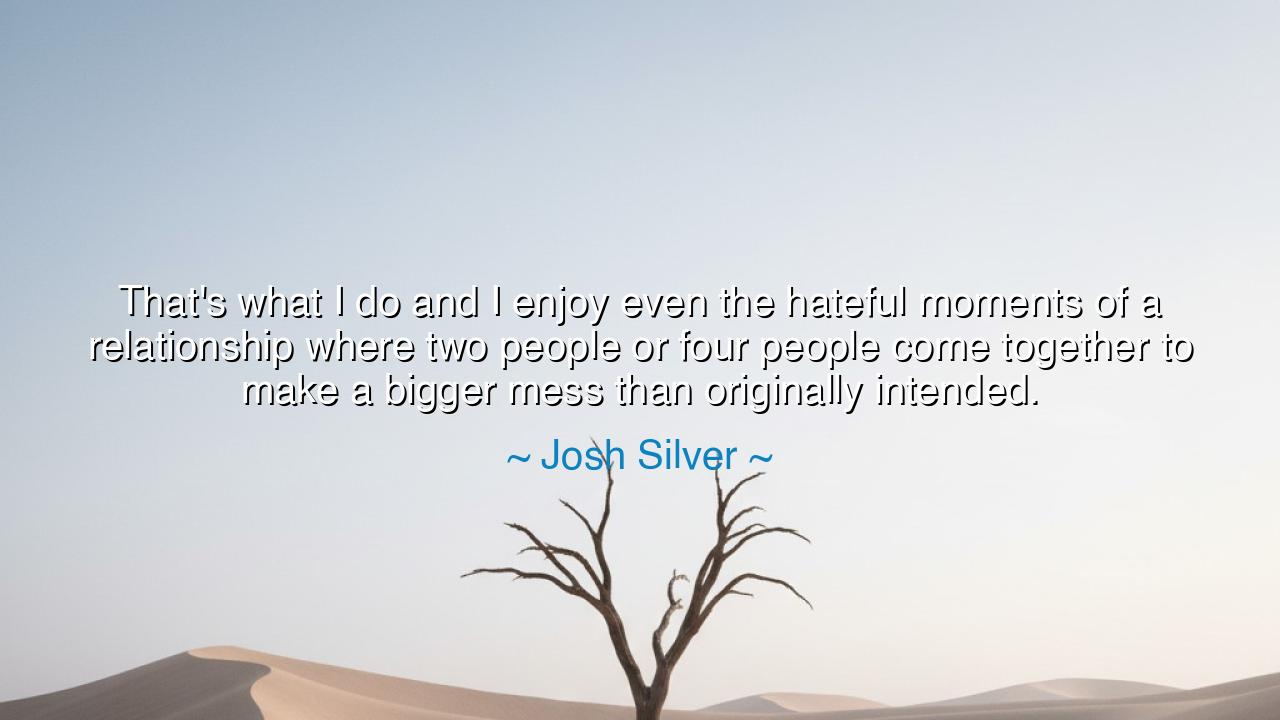
That's what I do and I enjoy even the hateful moments of a
That's what I do and I enjoy even the hateful moments of a relationship where two people or four people come together to make a bigger mess than originally intended.






Hear now the voice of Josh Silver, who speaks with candor of the tangled web of human bonds: “That’s what I do and I enjoy even the hateful moments of a relationship where two people or four people come together to make a bigger mess than originally intended.” In these words is found the strange truth of fellowship—that both joy and strife are woven into the fabric of relationships, and that to live fully is to embrace them both.
For when two people or more gather in closeness, harmony is never unbroken. Alongside tenderness walk misunderstanding, alongside laughter walks anger, and alongside union walks conflict. The mess is not failure, but the natural outpouring of human wills and desires colliding. Silver reminds us that even in the struggle, there is life, and even in the hateful moments, there is a hidden sweetness: proof that the bond is alive, not cold nor indifferent.
The ancients taught that fire both warms and burns, yet without it no hearth can endure. So too is the fire of relationships: it may wound, it may scorch, but it also gives light and heat. To shun the conflict is to shun the very depth of human connection, for in striving with one another, we reveal our truest selves. The bigger mess becomes the crucible where patience, forgiveness, and resilience are forged.
Thus, let all who seek union remember: perfection is an illusion, but shared struggle is real. To embrace the mess is to embrace the humanity of one’s companions, to find joy not only in the easy moments but in the storms as well. In this way, Silver offers not despair, but hidden wisdom—that even discord can be cherished, for it is the echo of hearts that dared to meet.






KNKhang Nguyen
It’s intriguing how Josh Silver seems to find enjoyment even in the 'hateful moments' of relationships. Is this a healthy perspective? On one hand, it speaks to resilience and the ability to see value in the hard times. But on the other hand, could this attitude lead to staying in unhealthy situations longer than necessary? Should we really embrace all the mess, or are there times when we should cut ties and move on from the chaos?
HNha nong
This quote strikes me as a reminder that relationships aren’t always about smooth sailing. The 'hateful moments' and 'bigger messes' are inevitable, and they play a significant role in testing the strength and authenticity of our bonds. But how do we find the balance between embracing these messy moments and not letting them overwhelm us? Can we appreciate the growth that comes with mess without letting it consume the relationship?
GDGold D.dragon
Josh Silver’s words seem to suggest that there’s beauty in the imperfection of relationships. Acknowledging that not everything will go smoothly, and that sometimes the result is more 'mess' than expected, is refreshing. It makes me wonder, though, if we truly embrace these messy moments or if we constantly try to avoid them out of fear of discomfort or judgment. Should we be more accepting of the imperfect, messy parts of relationships?
GNGiang ne
I can relate to this quote in a way because it’s not just about the harmony in relationships but also the challenges that come with them. Sometimes, the chaos or frustration can teach us valuable lessons. But do you ever feel that people sometimes try too hard to control the mess? Is it possible that we should let go and allow things to naturally unfold, even if it gets messy at times?
GNGiang Nguyen
This quote makes me reflect on the dynamics of collaboration and relationships. Whether it’s in friendships, family, or work, bringing different people together can often lead to unexpected results. The idea of making a 'bigger mess' seems to suggest that mistakes and disagreements are part of the process. How often do we try to avoid conflict or mess, when in fact, it might be essential to moving forward and understanding one another?